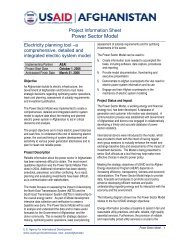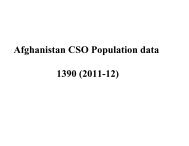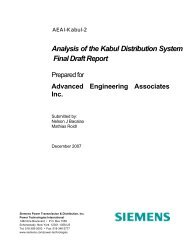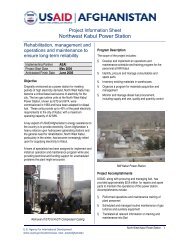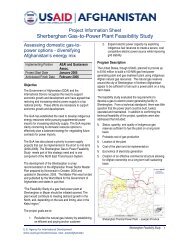prioritization and implementation plan - Cooperazione Italiana allo ...
prioritization and implementation plan - Cooperazione Italiana allo ...
prioritization and implementation plan - Cooperazione Italiana allo ...
Create successful ePaper yourself
Turn your PDF publications into a flip-book with our unique Google optimized e-Paper software.
AFGHANISTAN NATIONAL DEVELOPMENT STRATEGY<br />
PRIORITIZATION AND IMPLEMENTATION PLAN<br />
MID 2010 – MID 2013<br />
EXECUTIVE SUMMARY<br />
On July 20, 2010, the Government of the Islamic<br />
Republic of Afghanistan <strong>and</strong> the international<br />
community met in Kabul to deliberate on <strong>and</strong><br />
endorse an Afghan-led action <strong>plan</strong> to improve<br />
governance, social <strong>and</strong> economic development,<br />
<strong>and</strong> security. Demonstrating a renewed<br />
commitment to the People of Afghanistan within<br />
the framework of the Afghanistan National<br />
Development Strategy, the new generation of<br />
National Priority Programs presented at the Kabul<br />
International Conference on Afghanistan aim to<br />
empower all Afghan citizens <strong>and</strong> government <strong>and</strong><br />
non-governmental institutions to contribute to<br />
improved service delivery, job creation, equitable<br />
economic growth, the protection of all Afghan<br />
citizens’ rights, <strong>and</strong> a durable <strong>and</strong> inclusive peace.<br />
In essence, these programs define the Kabul<br />
Process.<br />
The start of the Kabul Process represents a turning<br />
point for the People of Afghanistan <strong>and</strong> their<br />
international partners. Unlike the past, when<br />
programs were largely prepared <strong>and</strong> implemented<br />
by international cooperation partners, now the<br />
Afghan Government <strong>and</strong> its many development<br />
partners across civil society <strong>and</strong> the private sector<br />
have the leadership <strong>and</strong> institutional capabilities to<br />
realize the full benefits of a National Priority<br />
Program approach. With the prevalence of violent<br />
extremism, pervasive poverty, <strong>and</strong> perceived highlevels<br />
of corruption across many State institutions,<br />
adopting a prioritized programmatic approach is a<br />
practical <strong>and</strong> moral imperative for three main<br />
reasons:<br />
i. First, the Afghan Government must improve<br />
the lives of all Afghan citizens. Only through<br />
providing poverty reducing social services,<br />
establishing law <strong>and</strong> order, <strong>and</strong> fostering<br />
economic activity nationwide can the Afghan<br />
Government garner confidence <strong>and</strong> legitimacy<br />
4<br />
in the eyes of its constituents. Further, Afghanled<br />
programs with a national reach, that<br />
provide for the unique circumstances of<br />
different provinces <strong>and</strong> districts, can build<br />
loyalty for the central government, unifying the<br />
country <strong>and</strong> ensuring greater national, as well<br />
as provincial, stability. Ongoing peace <strong>and</strong><br />
reconciliation efforts are based on this<br />
commitment to inclusivity <strong>and</strong> equity for all<br />
Afghan citizens.<br />
ii. Second, the Afghan Government recognizes its<br />
current limited capacity to design <strong>and</strong><br />
undertake overly-ambitious programs, <strong>and</strong> the<br />
often-unrelated proliferation of poorly<br />
integrated projects. By concentrating on the<br />
delivery of a smaller number of large-scale<br />
National Priority Programs focused on delivery<br />
over the course of the next three years, returns<br />
to growth, revenues, <strong>and</strong> employment will be<br />
increased, as will national capacities in selfgovernance<br />
<strong>and</strong> service delivery.<br />
iii. Third, it is only through the provision of a<br />
clear, prioritized agenda that international<br />
partners can align behind Afghan leadership.<br />
This transfer of responsibility is critical to<br />
increase aid effectiveness. And it enables<br />
international partners to fulfill their pledge to<br />
increase the percentage of their aid aligned<br />
behind Afghan priorities through Afghan<br />
systems.<br />
The main storyline of the Kabul International<br />
Conference on Afghanistan is a story of hope,<br />
determination, pragmatism, <strong>and</strong> peace. 1 Since late<br />
1 The “Faces of Hope” Photographic Essay in support of<br />
the Kabul Conference, financed by the Government of<br />
Afghanistan, can be viewed at<br />
http://www.afghanistanfacesofhope.com.




